A Comprehensive Analysis of Quality Management at Britannia Hotels
VerifiedAdded on 2023/01/06
|11
|3280
|1
Report
AI Summary
This report provides an executive summary of the quality management issues faced by Britannia Hotels, a hotel chain consistently ranked poorly in customer satisfaction. The report delves into the concept of quality management, its components, and evolution, highlighting the importance of maintaining desired service levels. It identifies specific problems experienced by Britannia Hotels, including poor service, cleanliness, and responsiveness, and uses the SERVQUAL model to assess the gaps between customer expectations and experiences. The report recommends the use of benchmarking as a technique to improve quality standards, focusing on the steps involved in planning, analysis, integration, action, and maturity. The report suggests Britannia Hotels adopt Juran's trilogy of total quality management to improve its quality standards and attract customers. The report emphasizes the need for the hotel to address these issues to regain customer trust and improve its competitiveness in the hospitality industry. The analysis includes benchmarking against competitors and the implementation of quality management principles to achieve customer satisfaction and reduce costs. The report concludes with recommendations for Britannia Hotels to improve its services and achieve long-term success.
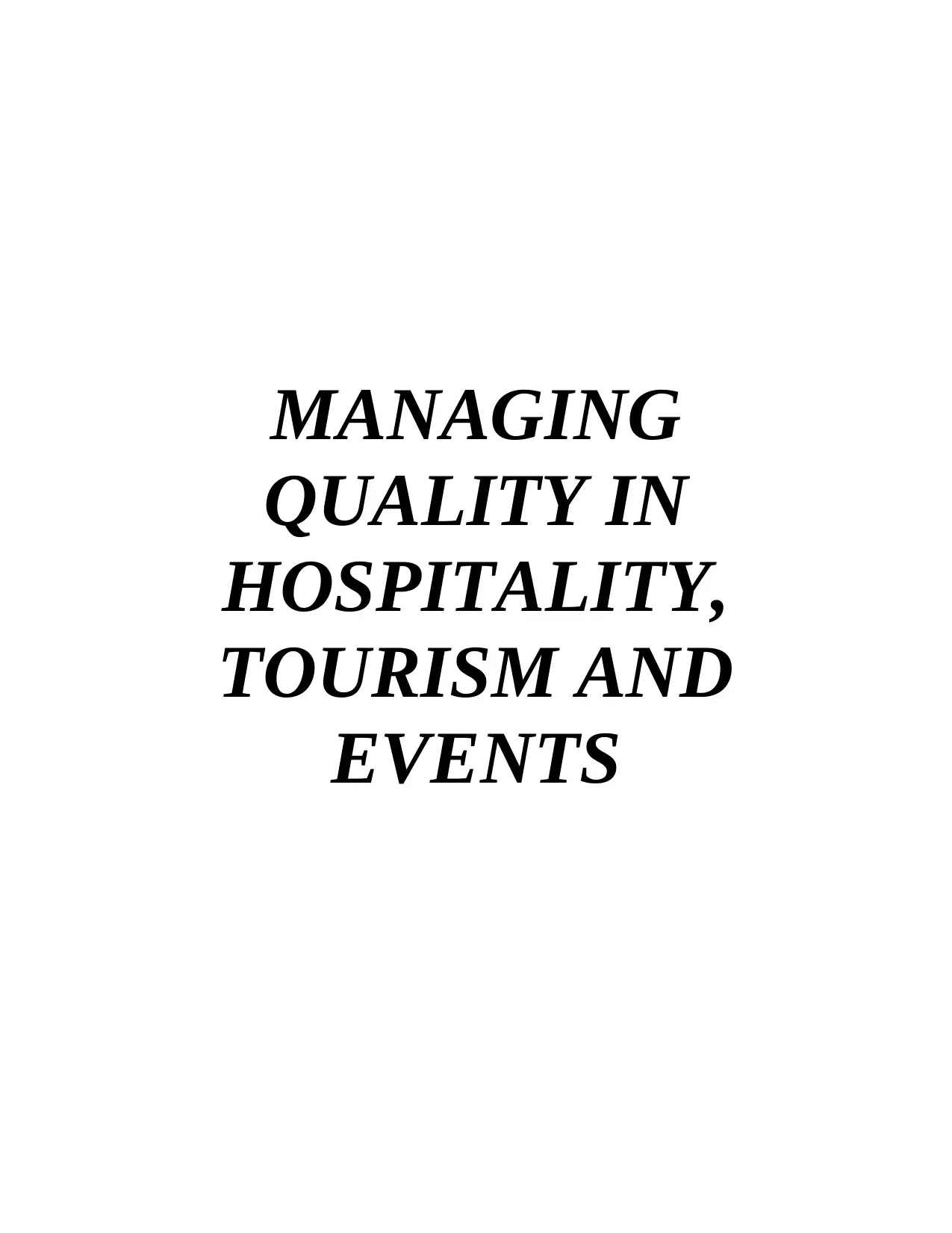
MANAGING
QUALITY IN
HOSPITALITY,
TOURISM AND
EVENTS
QUALITY IN
HOSPITALITY,
TOURISM AND
EVENTS
Paraphrase This Document
Need a fresh take? Get an instant paraphrase of this document with our AI Paraphraser
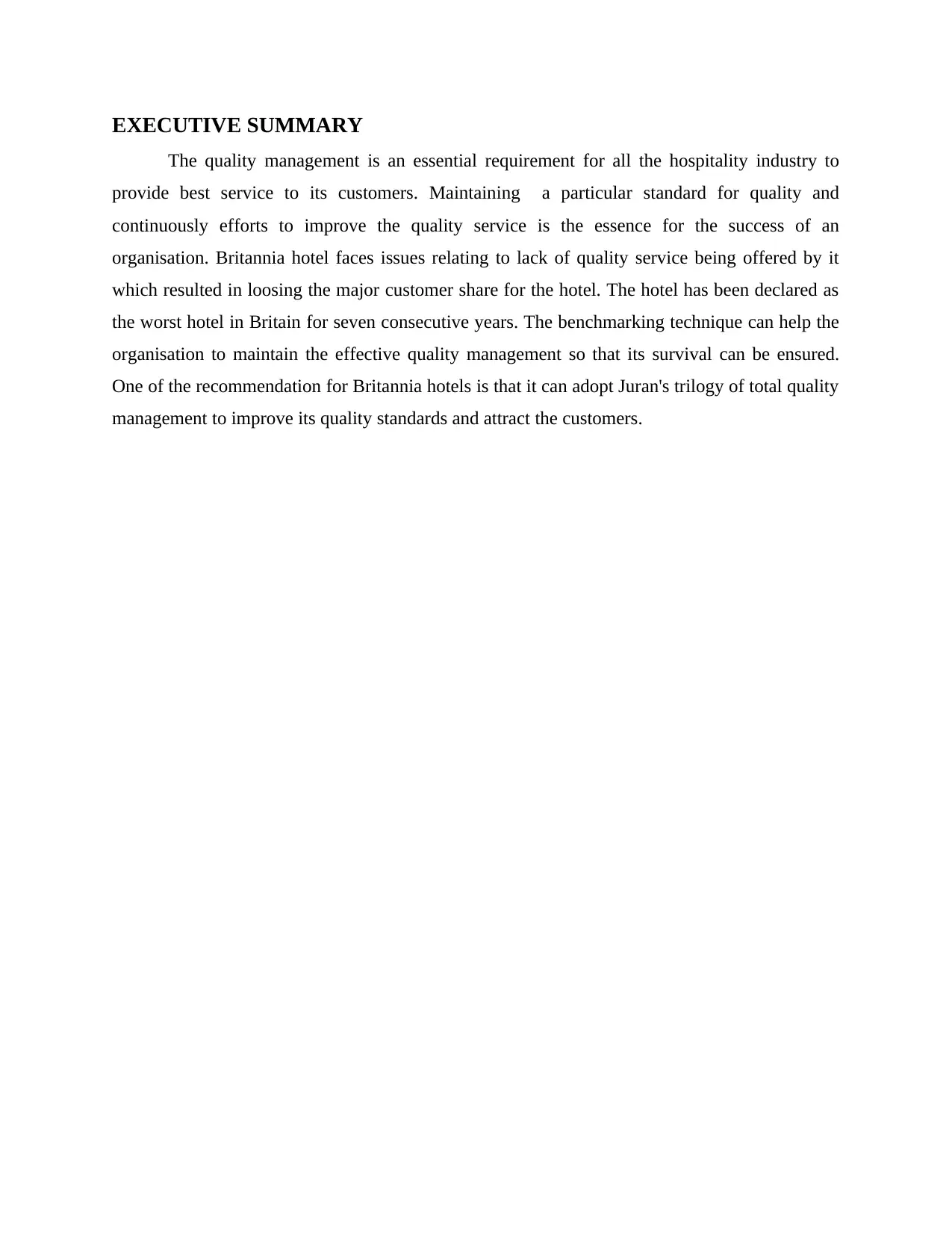
EXECUTIVE SUMMARY
The quality management is an essential requirement for all the hospitality industry to
provide best service to its customers. Maintaining a particular standard for quality and
continuously efforts to improve the quality service is the essence for the success of an
organisation. Britannia hotel faces issues relating to lack of quality service being offered by it
which resulted in loosing the major customer share for the hotel. The hotel has been declared as
the worst hotel in Britain for seven consecutive years. The benchmarking technique can help the
organisation to maintain the effective quality management so that its survival can be ensured.
One of the recommendation for Britannia hotels is that it can adopt Juran's trilogy of total quality
management to improve its quality standards and attract the customers.
The quality management is an essential requirement for all the hospitality industry to
provide best service to its customers. Maintaining a particular standard for quality and
continuously efforts to improve the quality service is the essence for the success of an
organisation. Britannia hotel faces issues relating to lack of quality service being offered by it
which resulted in loosing the major customer share for the hotel. The hotel has been declared as
the worst hotel in Britain for seven consecutive years. The benchmarking technique can help the
organisation to maintain the effective quality management so that its survival can be ensured.
One of the recommendation for Britannia hotels is that it can adopt Juran's trilogy of total quality
management to improve its quality standards and attract the customers.
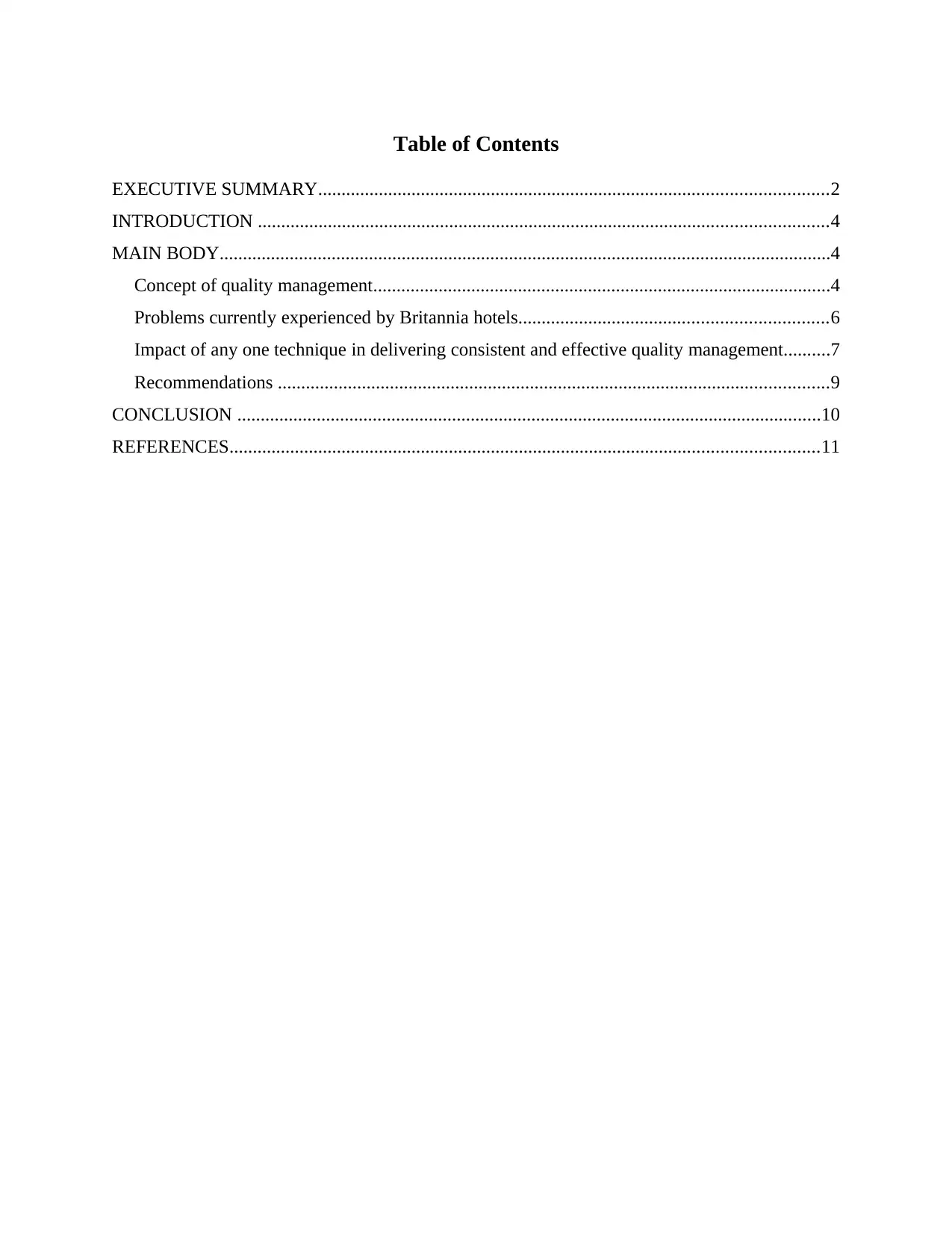
Table of Contents
EXECUTIVE SUMMARY.............................................................................................................2
INTRODUCTION ..........................................................................................................................4
MAIN BODY...................................................................................................................................4
Concept of quality management..................................................................................................4
Problems currently experienced by Britannia hotels..................................................................6
Impact of any one technique in delivering consistent and effective quality management..........7
Recommendations ......................................................................................................................9
CONCLUSION .............................................................................................................................10
REFERENCES..............................................................................................................................11
EXECUTIVE SUMMARY.............................................................................................................2
INTRODUCTION ..........................................................................................................................4
MAIN BODY...................................................................................................................................4
Concept of quality management..................................................................................................4
Problems currently experienced by Britannia hotels..................................................................6
Impact of any one technique in delivering consistent and effective quality management..........7
Recommendations ......................................................................................................................9
CONCLUSION .............................................................................................................................10
REFERENCES..............................................................................................................................11
⊘ This is a preview!⊘
Do you want full access?
Subscribe today to unlock all pages.

Trusted by 1+ million students worldwide
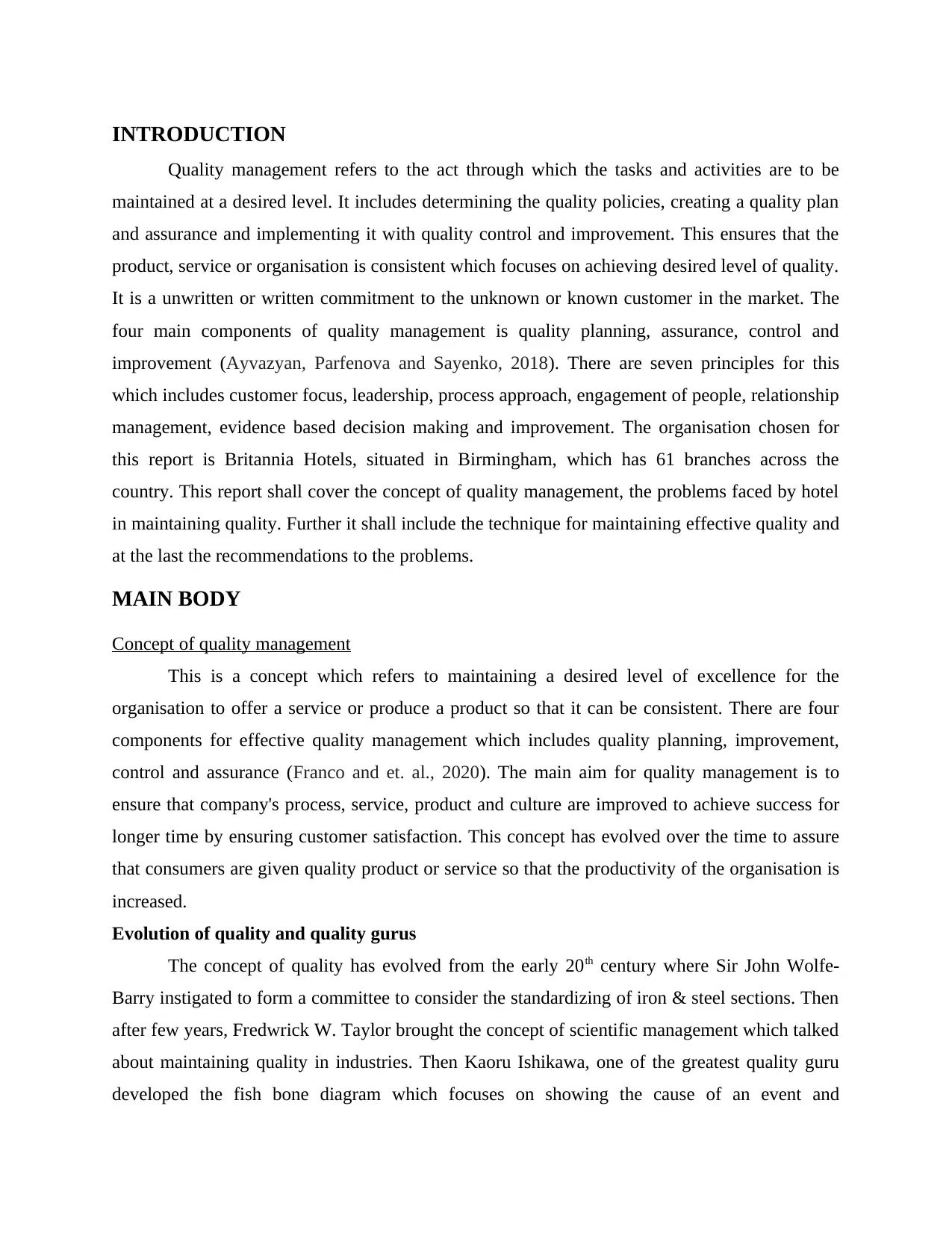
INTRODUCTION
Quality management refers to the act through which the tasks and activities are to be
maintained at a desired level. It includes determining the quality policies, creating a quality plan
and assurance and implementing it with quality control and improvement. This ensures that the
product, service or organisation is consistent which focuses on achieving desired level of quality.
It is a unwritten or written commitment to the unknown or known customer in the market. The
four main components of quality management is quality planning, assurance, control and
improvement (Ayvazyan, Parfenova and Sayenko, 2018). There are seven principles for this
which includes customer focus, leadership, process approach, engagement of people, relationship
management, evidence based decision making and improvement. The organisation chosen for
this report is Britannia Hotels, situated in Birmingham, which has 61 branches across the
country. This report shall cover the concept of quality management, the problems faced by hotel
in maintaining quality. Further it shall include the technique for maintaining effective quality and
at the last the recommendations to the problems.
MAIN BODY
Concept of quality management
This is a concept which refers to maintaining a desired level of excellence for the
organisation to offer a service or produce a product so that it can be consistent. There are four
components for effective quality management which includes quality planning, improvement,
control and assurance (Franco and et. al., 2020). The main aim for quality management is to
ensure that company's process, service, product and culture are improved to achieve success for
longer time by ensuring customer satisfaction. This concept has evolved over the time to assure
that consumers are given quality product or service so that the productivity of the organisation is
increased.
Evolution of quality and quality gurus
The concept of quality has evolved from the early 20th century where Sir John Wolfe-
Barry instigated to form a committee to consider the standardizing of iron & steel sections. Then
after few years, Fredwrick W. Taylor brought the concept of scientific management which talked
about maintaining quality in industries. Then Kaoru Ishikawa, one of the greatest quality guru
developed the fish bone diagram which focuses on showing the cause of an event and
Quality management refers to the act through which the tasks and activities are to be
maintained at a desired level. It includes determining the quality policies, creating a quality plan
and assurance and implementing it with quality control and improvement. This ensures that the
product, service or organisation is consistent which focuses on achieving desired level of quality.
It is a unwritten or written commitment to the unknown or known customer in the market. The
four main components of quality management is quality planning, assurance, control and
improvement (Ayvazyan, Parfenova and Sayenko, 2018). There are seven principles for this
which includes customer focus, leadership, process approach, engagement of people, relationship
management, evidence based decision making and improvement. The organisation chosen for
this report is Britannia Hotels, situated in Birmingham, which has 61 branches across the
country. This report shall cover the concept of quality management, the problems faced by hotel
in maintaining quality. Further it shall include the technique for maintaining effective quality and
at the last the recommendations to the problems.
MAIN BODY
Concept of quality management
This is a concept which refers to maintaining a desired level of excellence for the
organisation to offer a service or produce a product so that it can be consistent. There are four
components for effective quality management which includes quality planning, improvement,
control and assurance (Franco and et. al., 2020). The main aim for quality management is to
ensure that company's process, service, product and culture are improved to achieve success for
longer time by ensuring customer satisfaction. This concept has evolved over the time to assure
that consumers are given quality product or service so that the productivity of the organisation is
increased.
Evolution of quality and quality gurus
The concept of quality has evolved from the early 20th century where Sir John Wolfe-
Barry instigated to form a committee to consider the standardizing of iron & steel sections. Then
after few years, Fredwrick W. Taylor brought the concept of scientific management which talked
about maintaining quality in industries. Then Kaoru Ishikawa, one of the greatest quality guru
developed the fish bone diagram which focuses on showing the cause of an event and
Paraphrase This Document
Need a fresh take? Get an instant paraphrase of this document with our AI Paraphraser
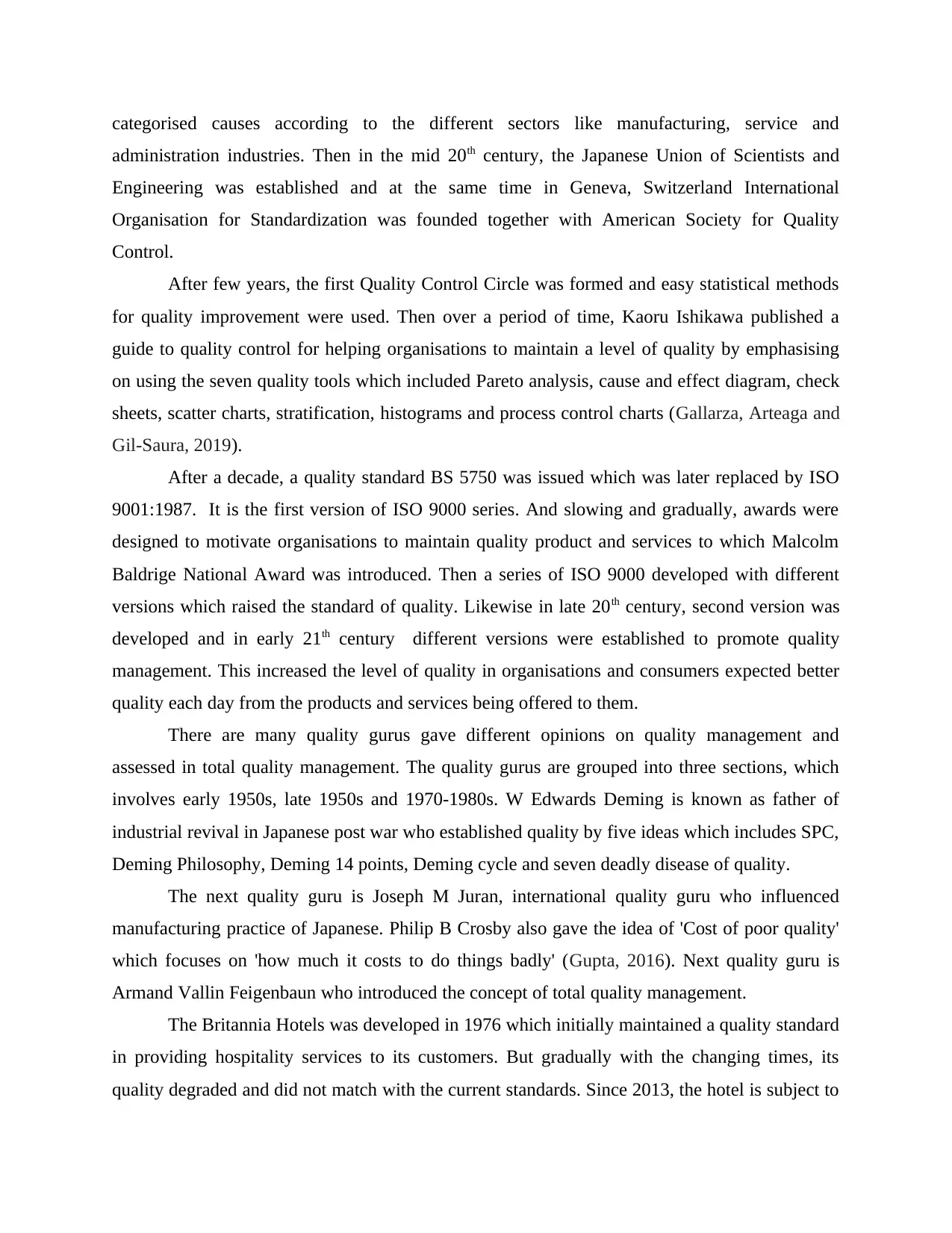
categorised causes according to the different sectors like manufacturing, service and
administration industries. Then in the mid 20th century, the Japanese Union of Scientists and
Engineering was established and at the same time in Geneva, Switzerland International
Organisation for Standardization was founded together with American Society for Quality
Control.
After few years, the first Quality Control Circle was formed and easy statistical methods
for quality improvement were used. Then over a period of time, Kaoru Ishikawa published a
guide to quality control for helping organisations to maintain a level of quality by emphasising
on using the seven quality tools which included Pareto analysis, cause and effect diagram, check
sheets, scatter charts, stratification, histograms and process control charts (Gallarza, Arteaga and
Gil-Saura, 2019).
After a decade, a quality standard BS 5750 was issued which was later replaced by ISO
9001:1987. It is the first version of ISO 9000 series. And slowing and gradually, awards were
designed to motivate organisations to maintain quality product and services to which Malcolm
Baldrige National Award was introduced. Then a series of ISO 9000 developed with different
versions which raised the standard of quality. Likewise in late 20th century, second version was
developed and in early 21th century different versions were established to promote quality
management. This increased the level of quality in organisations and consumers expected better
quality each day from the products and services being offered to them.
There are many quality gurus gave different opinions on quality management and
assessed in total quality management. The quality gurus are grouped into three sections, which
involves early 1950s, late 1950s and 1970-1980s. W Edwards Deming is known as father of
industrial revival in Japanese post war who established quality by five ideas which includes SPC,
Deming Philosophy, Deming 14 points, Deming cycle and seven deadly disease of quality.
The next quality guru is Joseph M Juran, international quality guru who influenced
manufacturing practice of Japanese. Philip B Crosby also gave the idea of 'Cost of poor quality'
which focuses on 'how much it costs to do things badly' (Gupta, 2016). Next quality guru is
Armand Vallin Feigenbaun who introduced the concept of total quality management.
The Britannia Hotels was developed in 1976 which initially maintained a quality standard
in providing hospitality services to its customers. But gradually with the changing times, its
quality degraded and did not match with the current standards. Since 2013, the hotel is subject to
administration industries. Then in the mid 20th century, the Japanese Union of Scientists and
Engineering was established and at the same time in Geneva, Switzerland International
Organisation for Standardization was founded together with American Society for Quality
Control.
After few years, the first Quality Control Circle was formed and easy statistical methods
for quality improvement were used. Then over a period of time, Kaoru Ishikawa published a
guide to quality control for helping organisations to maintain a level of quality by emphasising
on using the seven quality tools which included Pareto analysis, cause and effect diagram, check
sheets, scatter charts, stratification, histograms and process control charts (Gallarza, Arteaga and
Gil-Saura, 2019).
After a decade, a quality standard BS 5750 was issued which was later replaced by ISO
9001:1987. It is the first version of ISO 9000 series. And slowing and gradually, awards were
designed to motivate organisations to maintain quality product and services to which Malcolm
Baldrige National Award was introduced. Then a series of ISO 9000 developed with different
versions which raised the standard of quality. Likewise in late 20th century, second version was
developed and in early 21th century different versions were established to promote quality
management. This increased the level of quality in organisations and consumers expected better
quality each day from the products and services being offered to them.
There are many quality gurus gave different opinions on quality management and
assessed in total quality management. The quality gurus are grouped into three sections, which
involves early 1950s, late 1950s and 1970-1980s. W Edwards Deming is known as father of
industrial revival in Japanese post war who established quality by five ideas which includes SPC,
Deming Philosophy, Deming 14 points, Deming cycle and seven deadly disease of quality.
The next quality guru is Joseph M Juran, international quality guru who influenced
manufacturing practice of Japanese. Philip B Crosby also gave the idea of 'Cost of poor quality'
which focuses on 'how much it costs to do things badly' (Gupta, 2016). Next quality guru is
Armand Vallin Feigenbaun who introduced the concept of total quality management.
The Britannia Hotels was developed in 1976 which initially maintained a quality standard
in providing hospitality services to its customers. But gradually with the changing times, its
quality degraded and did not match with the current standards. Since 2013, the hotel is subject to
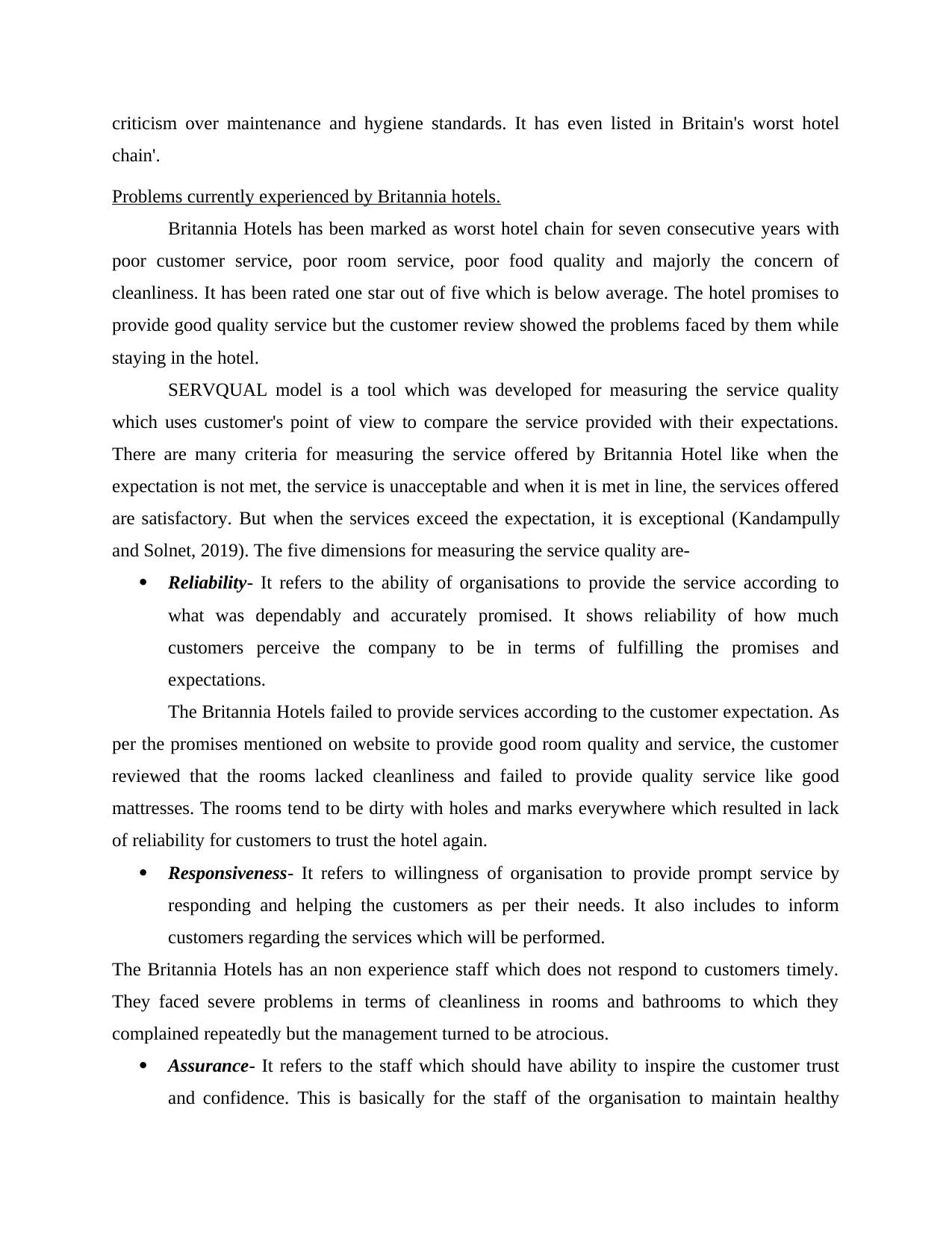
criticism over maintenance and hygiene standards. It has even listed in Britain's worst hotel
chain'.
Problems currently experienced by Britannia hotels.
Britannia Hotels has been marked as worst hotel chain for seven consecutive years with
poor customer service, poor room service, poor food quality and majorly the concern of
cleanliness. It has been rated one star out of five which is below average. The hotel promises to
provide good quality service but the customer review showed the problems faced by them while
staying in the hotel.
SERVQUAL model is a tool which was developed for measuring the service quality
which uses customer's point of view to compare the service provided with their expectations.
There are many criteria for measuring the service offered by Britannia Hotel like when the
expectation is not met, the service is unacceptable and when it is met in line, the services offered
are satisfactory. But when the services exceed the expectation, it is exceptional (Kandampully
and Solnet, 2019). The five dimensions for measuring the service quality are-
Reliability- It refers to the ability of organisations to provide the service according to
what was dependably and accurately promised. It shows reliability of how much
customers perceive the company to be in terms of fulfilling the promises and
expectations.
The Britannia Hotels failed to provide services according to the customer expectation. As
per the promises mentioned on website to provide good room quality and service, the customer
reviewed that the rooms lacked cleanliness and failed to provide quality service like good
mattresses. The rooms tend to be dirty with holes and marks everywhere which resulted in lack
of reliability for customers to trust the hotel again.
Responsiveness- It refers to willingness of organisation to provide prompt service by
responding and helping the customers as per their needs. It also includes to inform
customers regarding the services which will be performed.
The Britannia Hotels has an non experience staff which does not respond to customers timely.
They faced severe problems in terms of cleanliness in rooms and bathrooms to which they
complained repeatedly but the management turned to be atrocious.
Assurance- It refers to the staff which should have ability to inspire the customer trust
and confidence. This is basically for the staff of the organisation to maintain healthy
chain'.
Problems currently experienced by Britannia hotels.
Britannia Hotels has been marked as worst hotel chain for seven consecutive years with
poor customer service, poor room service, poor food quality and majorly the concern of
cleanliness. It has been rated one star out of five which is below average. The hotel promises to
provide good quality service but the customer review showed the problems faced by them while
staying in the hotel.
SERVQUAL model is a tool which was developed for measuring the service quality
which uses customer's point of view to compare the service provided with their expectations.
There are many criteria for measuring the service offered by Britannia Hotel like when the
expectation is not met, the service is unacceptable and when it is met in line, the services offered
are satisfactory. But when the services exceed the expectation, it is exceptional (Kandampully
and Solnet, 2019). The five dimensions for measuring the service quality are-
Reliability- It refers to the ability of organisations to provide the service according to
what was dependably and accurately promised. It shows reliability of how much
customers perceive the company to be in terms of fulfilling the promises and
expectations.
The Britannia Hotels failed to provide services according to the customer expectation. As
per the promises mentioned on website to provide good room quality and service, the customer
reviewed that the rooms lacked cleanliness and failed to provide quality service like good
mattresses. The rooms tend to be dirty with holes and marks everywhere which resulted in lack
of reliability for customers to trust the hotel again.
Responsiveness- It refers to willingness of organisation to provide prompt service by
responding and helping the customers as per their needs. It also includes to inform
customers regarding the services which will be performed.
The Britannia Hotels has an non experience staff which does not respond to customers timely.
They faced severe problems in terms of cleanliness in rooms and bathrooms to which they
complained repeatedly but the management turned to be atrocious.
Assurance- It refers to the staff which should have ability to inspire the customer trust
and confidence. This is basically for the staff of the organisation to maintain healthy
⊘ This is a preview!⊘
Do you want full access?
Subscribe today to unlock all pages.

Trusted by 1+ million students worldwide
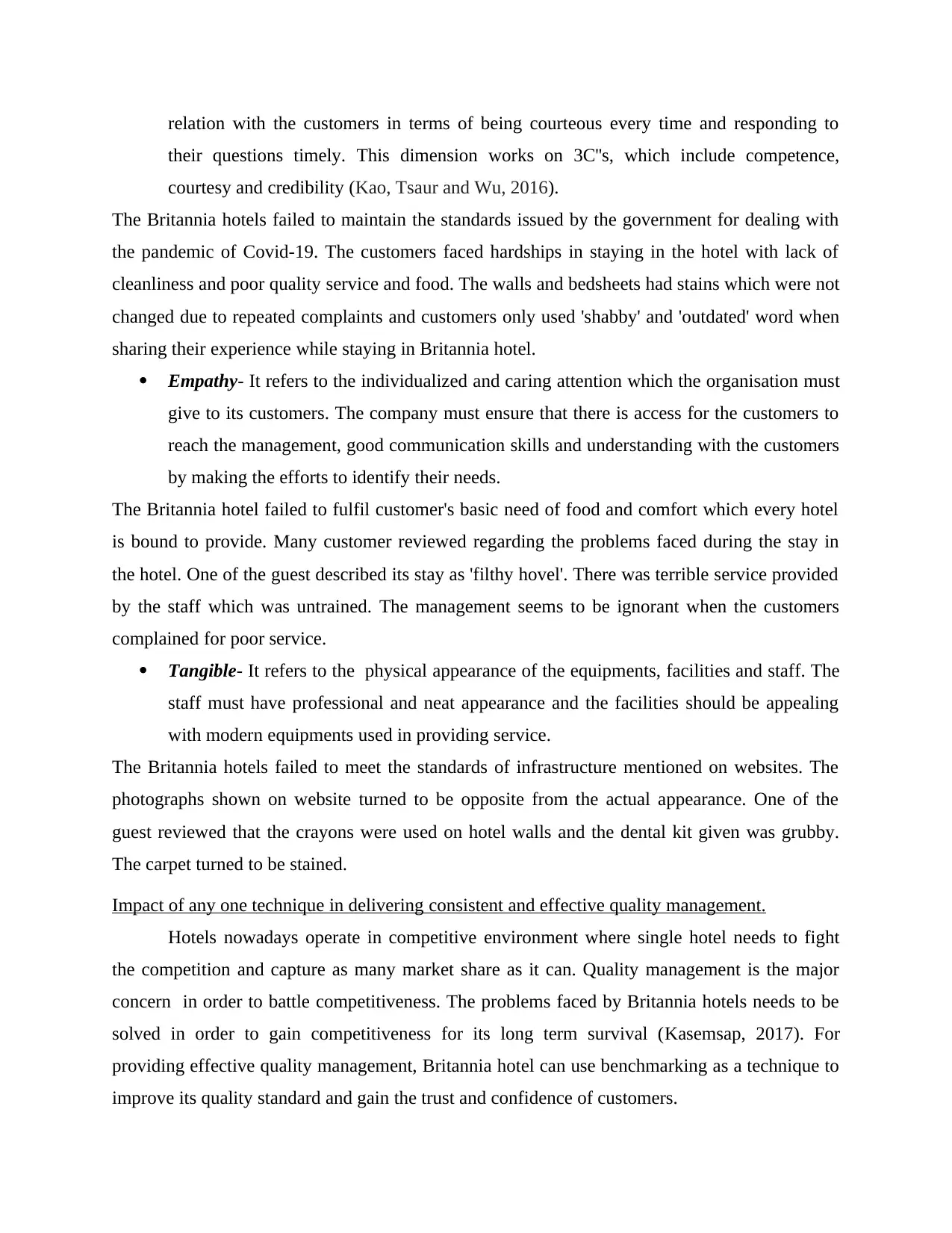
relation with the customers in terms of being courteous every time and responding to
their questions timely. This dimension works on 3C''s, which include competence,
courtesy and credibility (Kao, Tsaur and Wu, 2016).
The Britannia hotels failed to maintain the standards issued by the government for dealing with
the pandemic of Covid-19. The customers faced hardships in staying in the hotel with lack of
cleanliness and poor quality service and food. The walls and bedsheets had stains which were not
changed due to repeated complaints and customers only used 'shabby' and 'outdated' word when
sharing their experience while staying in Britannia hotel.
Empathy- It refers to the individualized and caring attention which the organisation must
give to its customers. The company must ensure that there is access for the customers to
reach the management, good communication skills and understanding with the customers
by making the efforts to identify their needs.
The Britannia hotel failed to fulfil customer's basic need of food and comfort which every hotel
is bound to provide. Many customer reviewed regarding the problems faced during the stay in
the hotel. One of the guest described its stay as 'filthy hovel'. There was terrible service provided
by the staff which was untrained. The management seems to be ignorant when the customers
complained for poor service.
Tangible- It refers to the physical appearance of the equipments, facilities and staff. The
staff must have professional and neat appearance and the facilities should be appealing
with modern equipments used in providing service.
The Britannia hotels failed to meet the standards of infrastructure mentioned on websites. The
photographs shown on website turned to be opposite from the actual appearance. One of the
guest reviewed that the crayons were used on hotel walls and the dental kit given was grubby.
The carpet turned to be stained.
Impact of any one technique in delivering consistent and effective quality management.
Hotels nowadays operate in competitive environment where single hotel needs to fight
the competition and capture as many market share as it can. Quality management is the major
concern in order to battle competitiveness. The problems faced by Britannia hotels needs to be
solved in order to gain competitiveness for its long term survival (Kasemsap, 2017). For
providing effective quality management, Britannia hotel can use benchmarking as a technique to
improve its quality standard and gain the trust and confidence of customers.
their questions timely. This dimension works on 3C''s, which include competence,
courtesy and credibility (Kao, Tsaur and Wu, 2016).
The Britannia hotels failed to maintain the standards issued by the government for dealing with
the pandemic of Covid-19. The customers faced hardships in staying in the hotel with lack of
cleanliness and poor quality service and food. The walls and bedsheets had stains which were not
changed due to repeated complaints and customers only used 'shabby' and 'outdated' word when
sharing their experience while staying in Britannia hotel.
Empathy- It refers to the individualized and caring attention which the organisation must
give to its customers. The company must ensure that there is access for the customers to
reach the management, good communication skills and understanding with the customers
by making the efforts to identify their needs.
The Britannia hotel failed to fulfil customer's basic need of food and comfort which every hotel
is bound to provide. Many customer reviewed regarding the problems faced during the stay in
the hotel. One of the guest described its stay as 'filthy hovel'. There was terrible service provided
by the staff which was untrained. The management seems to be ignorant when the customers
complained for poor service.
Tangible- It refers to the physical appearance of the equipments, facilities and staff. The
staff must have professional and neat appearance and the facilities should be appealing
with modern equipments used in providing service.
The Britannia hotels failed to meet the standards of infrastructure mentioned on websites. The
photographs shown on website turned to be opposite from the actual appearance. One of the
guest reviewed that the crayons were used on hotel walls and the dental kit given was grubby.
The carpet turned to be stained.
Impact of any one technique in delivering consistent and effective quality management.
Hotels nowadays operate in competitive environment where single hotel needs to fight
the competition and capture as many market share as it can. Quality management is the major
concern in order to battle competitiveness. The problems faced by Britannia hotels needs to be
solved in order to gain competitiveness for its long term survival (Kasemsap, 2017). For
providing effective quality management, Britannia hotel can use benchmarking as a technique to
improve its quality standard and gain the trust and confidence of customers.
Paraphrase This Document
Need a fresh take? Get an instant paraphrase of this document with our AI Paraphraser
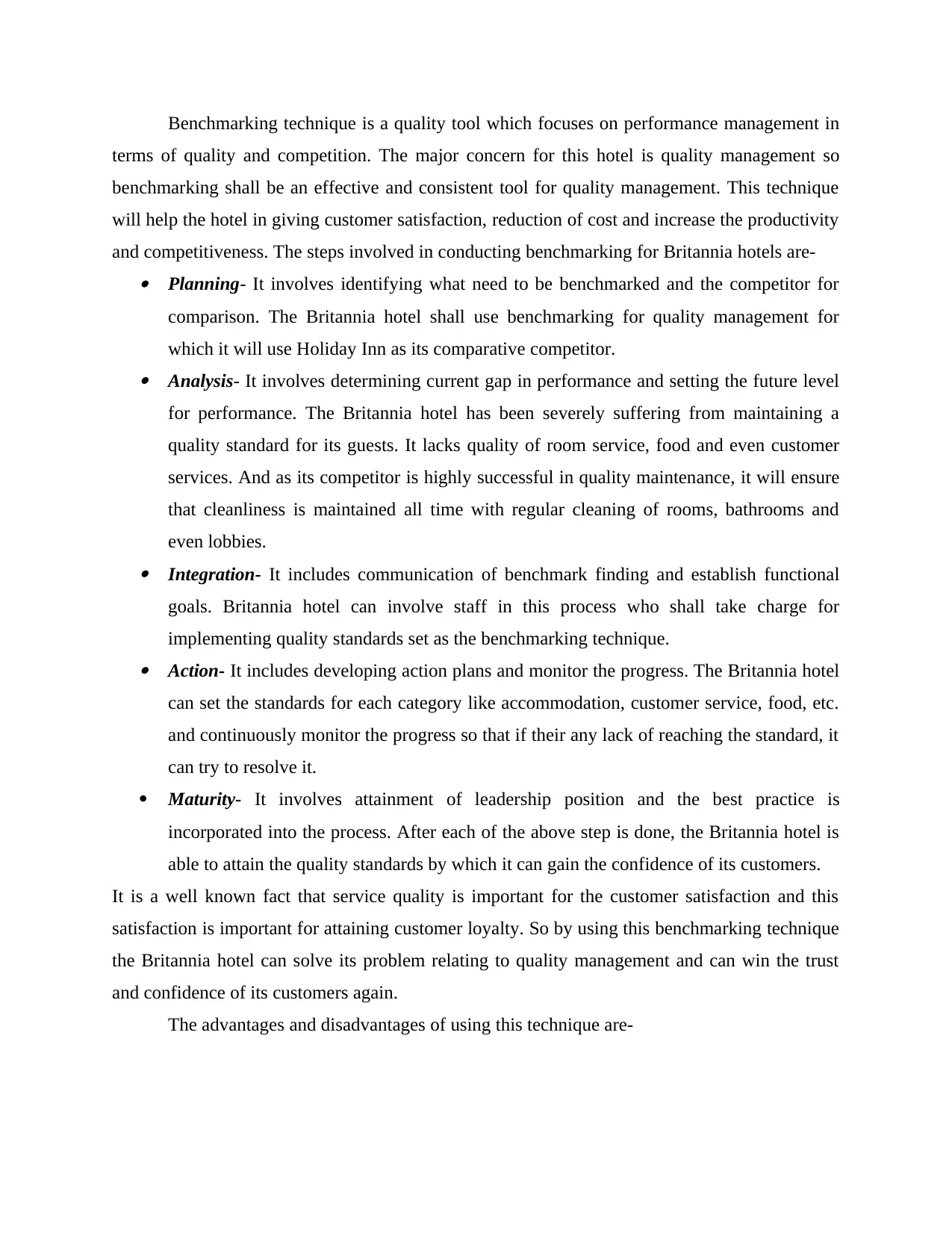
Benchmarking technique is a quality tool which focuses on performance management in
terms of quality and competition. The major concern for this hotel is quality management so
benchmarking shall be an effective and consistent tool for quality management. This technique
will help the hotel in giving customer satisfaction, reduction of cost and increase the productivity
and competitiveness. The steps involved in conducting benchmarking for Britannia hotels are- Planning- It involves identifying what need to be benchmarked and the competitor for
comparison. The Britannia hotel shall use benchmarking for quality management for
which it will use Holiday Inn as its comparative competitor. Analysis- It involves determining current gap in performance and setting the future level
for performance. The Britannia hotel has been severely suffering from maintaining a
quality standard for its guests. It lacks quality of room service, food and even customer
services. And as its competitor is highly successful in quality maintenance, it will ensure
that cleanliness is maintained all time with regular cleaning of rooms, bathrooms and
even lobbies. Integration- It includes communication of benchmark finding and establish functional
goals. Britannia hotel can involve staff in this process who shall take charge for
implementing quality standards set as the benchmarking technique. Action- It includes developing action plans and monitor the progress. The Britannia hotel
can set the standards for each category like accommodation, customer service, food, etc.
and continuously monitor the progress so that if their any lack of reaching the standard, it
can try to resolve it.
Maturity- It involves attainment of leadership position and the best practice is
incorporated into the process. After each of the above step is done, the Britannia hotel is
able to attain the quality standards by which it can gain the confidence of its customers.
It is a well known fact that service quality is important for the customer satisfaction and this
satisfaction is important for attaining customer loyalty. So by using this benchmarking technique
the Britannia hotel can solve its problem relating to quality management and can win the trust
and confidence of its customers again.
The advantages and disadvantages of using this technique are-
terms of quality and competition. The major concern for this hotel is quality management so
benchmarking shall be an effective and consistent tool for quality management. This technique
will help the hotel in giving customer satisfaction, reduction of cost and increase the productivity
and competitiveness. The steps involved in conducting benchmarking for Britannia hotels are- Planning- It involves identifying what need to be benchmarked and the competitor for
comparison. The Britannia hotel shall use benchmarking for quality management for
which it will use Holiday Inn as its comparative competitor. Analysis- It involves determining current gap in performance and setting the future level
for performance. The Britannia hotel has been severely suffering from maintaining a
quality standard for its guests. It lacks quality of room service, food and even customer
services. And as its competitor is highly successful in quality maintenance, it will ensure
that cleanliness is maintained all time with regular cleaning of rooms, bathrooms and
even lobbies. Integration- It includes communication of benchmark finding and establish functional
goals. Britannia hotel can involve staff in this process who shall take charge for
implementing quality standards set as the benchmarking technique. Action- It includes developing action plans and monitor the progress. The Britannia hotel
can set the standards for each category like accommodation, customer service, food, etc.
and continuously monitor the progress so that if their any lack of reaching the standard, it
can try to resolve it.
Maturity- It involves attainment of leadership position and the best practice is
incorporated into the process. After each of the above step is done, the Britannia hotel is
able to attain the quality standards by which it can gain the confidence of its customers.
It is a well known fact that service quality is important for the customer satisfaction and this
satisfaction is important for attaining customer loyalty. So by using this benchmarking technique
the Britannia hotel can solve its problem relating to quality management and can win the trust
and confidence of its customers again.
The advantages and disadvantages of using this technique are-
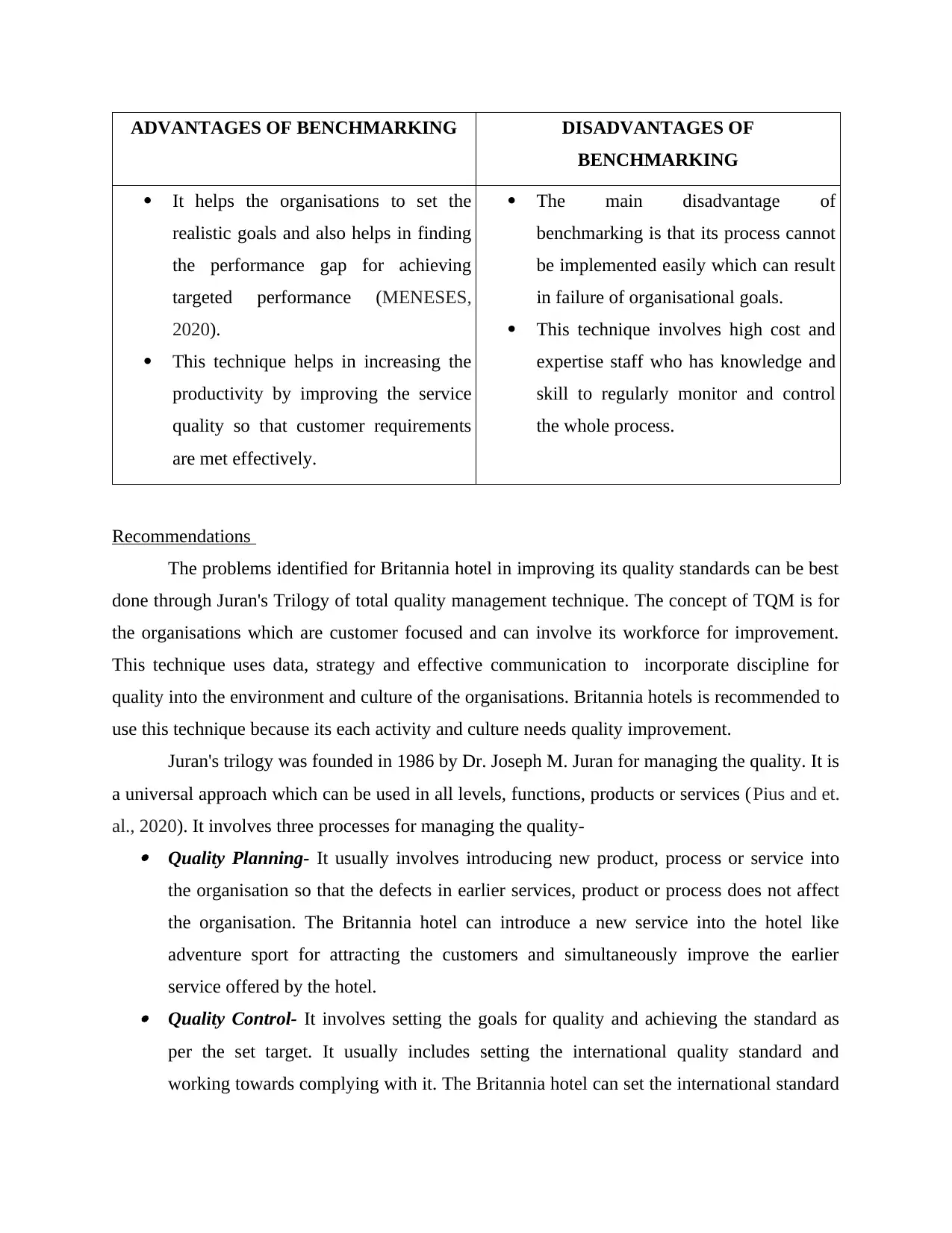
ADVANTAGES OF BENCHMARKING DISADVANTAGES OF
BENCHMARKING
It helps the organisations to set the
realistic goals and also helps in finding
the performance gap for achieving
targeted performance (MENESES,
2020).
This technique helps in increasing the
productivity by improving the service
quality so that customer requirements
are met effectively.
The main disadvantage of
benchmarking is that its process cannot
be implemented easily which can result
in failure of organisational goals.
This technique involves high cost and
expertise staff who has knowledge and
skill to regularly monitor and control
the whole process.
Recommendations
The problems identified for Britannia hotel in improving its quality standards can be best
done through Juran's Trilogy of total quality management technique. The concept of TQM is for
the organisations which are customer focused and can involve its workforce for improvement.
This technique uses data, strategy and effective communication to incorporate discipline for
quality into the environment and culture of the organisations. Britannia hotels is recommended to
use this technique because its each activity and culture needs quality improvement.
Juran's trilogy was founded in 1986 by Dr. Joseph M. Juran for managing the quality. It is
a universal approach which can be used in all levels, functions, products or services (Pius and et.
al., 2020). It involves three processes for managing the quality- Quality Planning- It usually involves introducing new product, process or service into
the organisation so that the defects in earlier services, product or process does not affect
the organisation. The Britannia hotel can introduce a new service into the hotel like
adventure sport for attracting the customers and simultaneously improve the earlier
service offered by the hotel. Quality Control- It involves setting the goals for quality and achieving the standard as
per the set target. It usually includes setting the international quality standard and
working towards complying with it. The Britannia hotel can set the international standard
BENCHMARKING
It helps the organisations to set the
realistic goals and also helps in finding
the performance gap for achieving
targeted performance (MENESES,
2020).
This technique helps in increasing the
productivity by improving the service
quality so that customer requirements
are met effectively.
The main disadvantage of
benchmarking is that its process cannot
be implemented easily which can result
in failure of organisational goals.
This technique involves high cost and
expertise staff who has knowledge and
skill to regularly monitor and control
the whole process.
Recommendations
The problems identified for Britannia hotel in improving its quality standards can be best
done through Juran's Trilogy of total quality management technique. The concept of TQM is for
the organisations which are customer focused and can involve its workforce for improvement.
This technique uses data, strategy and effective communication to incorporate discipline for
quality into the environment and culture of the organisations. Britannia hotels is recommended to
use this technique because its each activity and culture needs quality improvement.
Juran's trilogy was founded in 1986 by Dr. Joseph M. Juran for managing the quality. It is
a universal approach which can be used in all levels, functions, products or services (Pius and et.
al., 2020). It involves three processes for managing the quality- Quality Planning- It usually involves introducing new product, process or service into
the organisation so that the defects in earlier services, product or process does not affect
the organisation. The Britannia hotel can introduce a new service into the hotel like
adventure sport for attracting the customers and simultaneously improve the earlier
service offered by the hotel. Quality Control- It involves setting the goals for quality and achieving the standard as
per the set target. It usually includes setting the international quality standard and
working towards complying with it. The Britannia hotel can set the international standard
⊘ This is a preview!⊘
Do you want full access?
Subscribe today to unlock all pages.

Trusted by 1+ million students worldwide
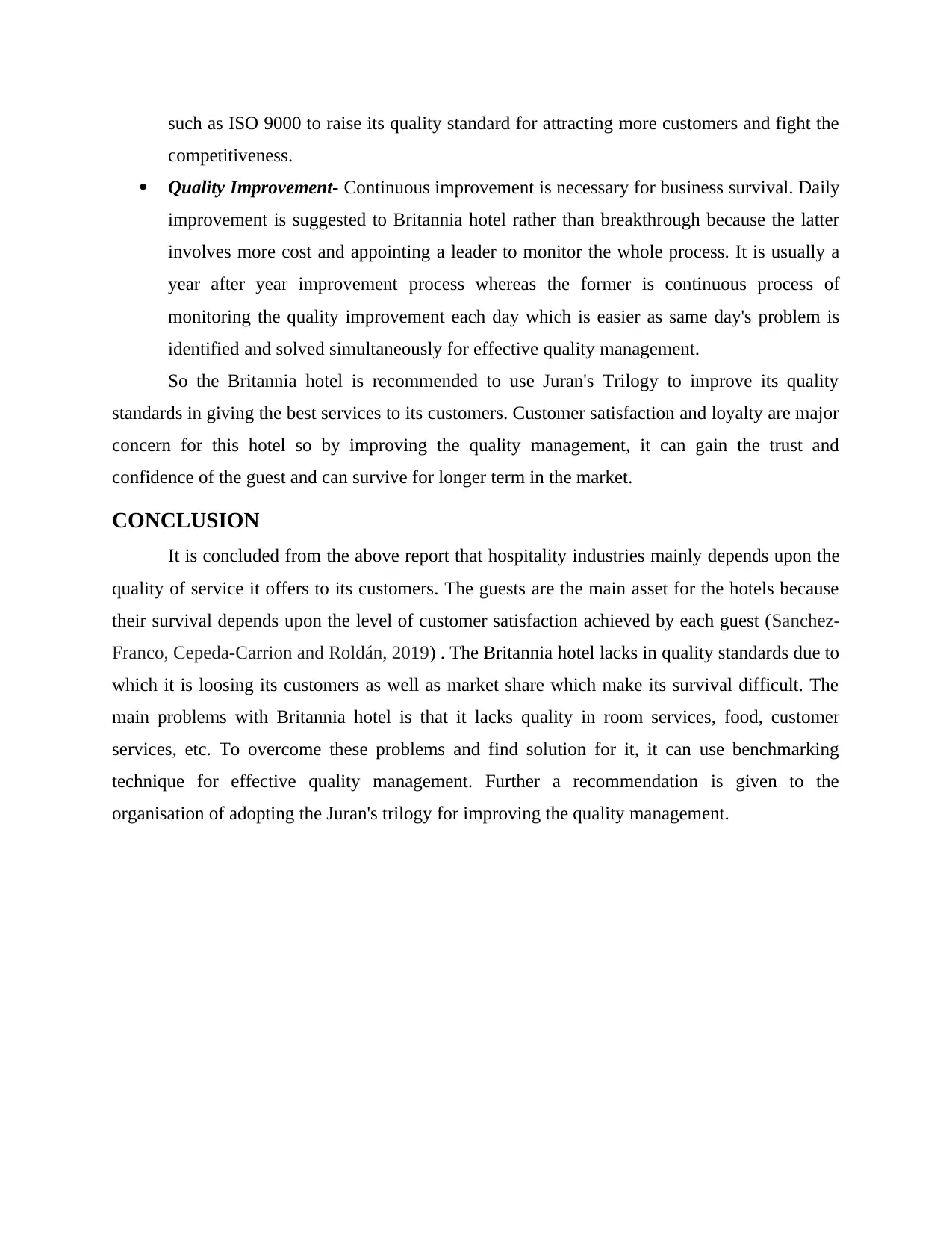
such as ISO 9000 to raise its quality standard for attracting more customers and fight the
competitiveness.
Quality Improvement- Continuous improvement is necessary for business survival. Daily
improvement is suggested to Britannia hotel rather than breakthrough because the latter
involves more cost and appointing a leader to monitor the whole process. It is usually a
year after year improvement process whereas the former is continuous process of
monitoring the quality improvement each day which is easier as same day's problem is
identified and solved simultaneously for effective quality management.
So the Britannia hotel is recommended to use Juran's Trilogy to improve its quality
standards in giving the best services to its customers. Customer satisfaction and loyalty are major
concern for this hotel so by improving the quality management, it can gain the trust and
confidence of the guest and can survive for longer term in the market.
CONCLUSION
It is concluded from the above report that hospitality industries mainly depends upon the
quality of service it offers to its customers. The guests are the main asset for the hotels because
their survival depends upon the level of customer satisfaction achieved by each guest (Sanchez-
Franco, Cepeda-Carrion and Roldán, 2019) . The Britannia hotel lacks in quality standards due to
which it is loosing its customers as well as market share which make its survival difficult. The
main problems with Britannia hotel is that it lacks quality in room services, food, customer
services, etc. To overcome these problems and find solution for it, it can use benchmarking
technique for effective quality management. Further a recommendation is given to the
organisation of adopting the Juran's trilogy for improving the quality management.
competitiveness.
Quality Improvement- Continuous improvement is necessary for business survival. Daily
improvement is suggested to Britannia hotel rather than breakthrough because the latter
involves more cost and appointing a leader to monitor the whole process. It is usually a
year after year improvement process whereas the former is continuous process of
monitoring the quality improvement each day which is easier as same day's problem is
identified and solved simultaneously for effective quality management.
So the Britannia hotel is recommended to use Juran's Trilogy to improve its quality
standards in giving the best services to its customers. Customer satisfaction and loyalty are major
concern for this hotel so by improving the quality management, it can gain the trust and
confidence of the guest and can survive for longer term in the market.
CONCLUSION
It is concluded from the above report that hospitality industries mainly depends upon the
quality of service it offers to its customers. The guests are the main asset for the hotels because
their survival depends upon the level of customer satisfaction achieved by each guest (Sanchez-
Franco, Cepeda-Carrion and Roldán, 2019) . The Britannia hotel lacks in quality standards due to
which it is loosing its customers as well as market share which make its survival difficult. The
main problems with Britannia hotel is that it lacks quality in room services, food, customer
services, etc. To overcome these problems and find solution for it, it can use benchmarking
technique for effective quality management. Further a recommendation is given to the
organisation of adopting the Juran's trilogy for improving the quality management.
Paraphrase This Document
Need a fresh take? Get an instant paraphrase of this document with our AI Paraphraser
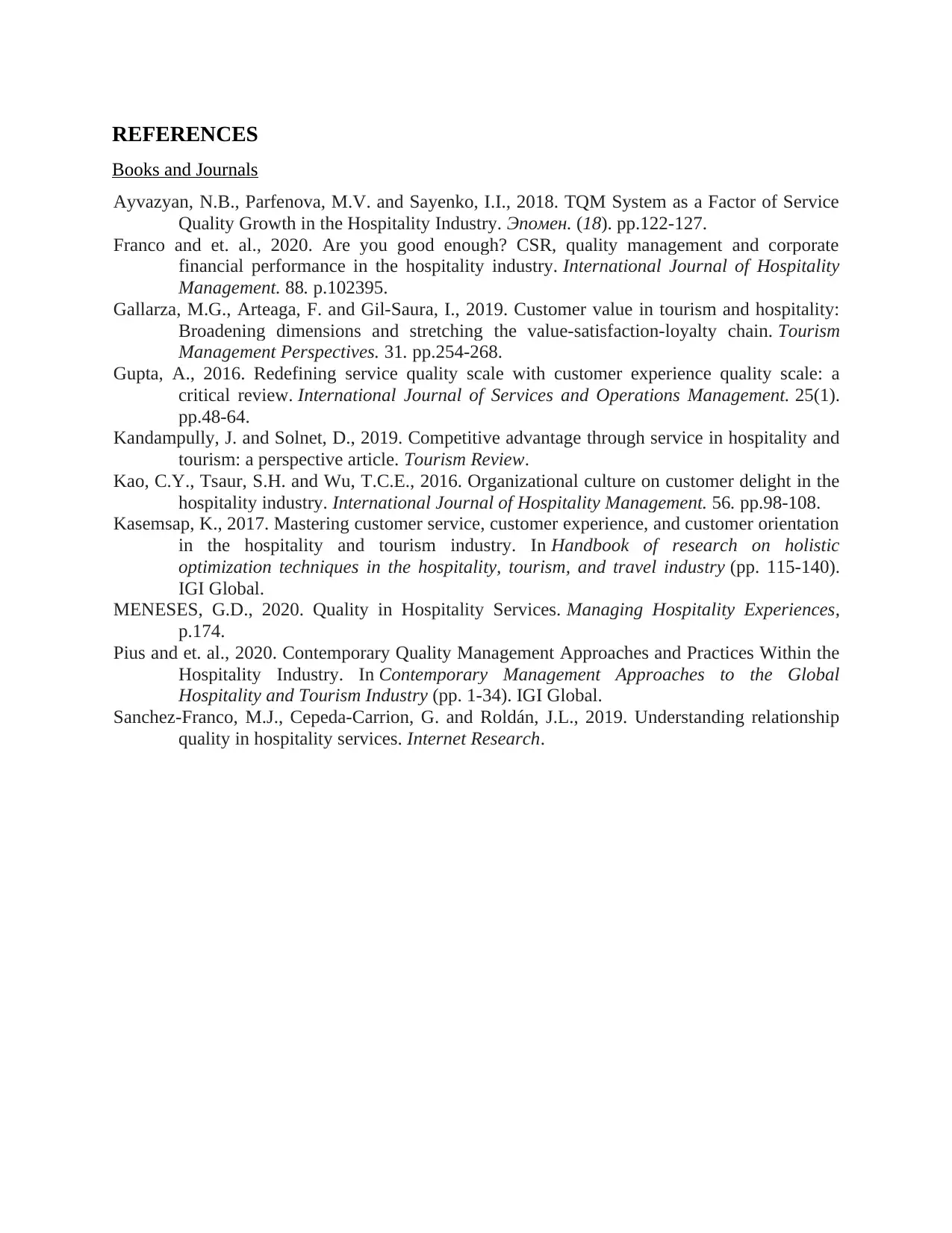
REFERENCES
Books and Journals
Ayvazyan, N.B., Parfenova, M.V. and Sayenko, I.I., 2018. TQM System as a Factor of Service
Quality Growth in the Hospitality Industry. Эпомен. (18). pp.122-127.
Franco and et. al., 2020. Are you good enough? CSR, quality management and corporate
financial performance in the hospitality industry. International Journal of Hospitality
Management. 88. p.102395.
Gallarza, M.G., Arteaga, F. and Gil-Saura, I., 2019. Customer value in tourism and hospitality:
Broadening dimensions and stretching the value-satisfaction-loyalty chain. Tourism
Management Perspectives. 31. pp.254-268.
Gupta, A., 2016. Redefining service quality scale with customer experience quality scale: a
critical review. International Journal of Services and Operations Management. 25(1).
pp.48-64.
Kandampully, J. and Solnet, D., 2019. Competitive advantage through service in hospitality and
tourism: a perspective article. Tourism Review.
Kao, C.Y., Tsaur, S.H. and Wu, T.C.E., 2016. Organizational culture on customer delight in the
hospitality industry. International Journal of Hospitality Management. 56. pp.98-108.
Kasemsap, K., 2017. Mastering customer service, customer experience, and customer orientation
in the hospitality and tourism industry. In Handbook of research on holistic
optimization techniques in the hospitality, tourism, and travel industry (pp. 115-140).
IGI Global.
MENESES, G.D., 2020. Quality in Hospitality Services. Managing Hospitality Experiences,
p.174.
Pius and et. al., 2020. Contemporary Quality Management Approaches and Practices Within the
Hospitality Industry. In Contemporary Management Approaches to the Global
Hospitality and Tourism Industry (pp. 1-34). IGI Global.
Sanchez-Franco, M.J., Cepeda-Carrion, G. and Roldán, J.L., 2019. Understanding relationship
quality in hospitality services. Internet Research.
Books and Journals
Ayvazyan, N.B., Parfenova, M.V. and Sayenko, I.I., 2018. TQM System as a Factor of Service
Quality Growth in the Hospitality Industry. Эпомен. (18). pp.122-127.
Franco and et. al., 2020. Are you good enough? CSR, quality management and corporate
financial performance in the hospitality industry. International Journal of Hospitality
Management. 88. p.102395.
Gallarza, M.G., Arteaga, F. and Gil-Saura, I., 2019. Customer value in tourism and hospitality:
Broadening dimensions and stretching the value-satisfaction-loyalty chain. Tourism
Management Perspectives. 31. pp.254-268.
Gupta, A., 2016. Redefining service quality scale with customer experience quality scale: a
critical review. International Journal of Services and Operations Management. 25(1).
pp.48-64.
Kandampully, J. and Solnet, D., 2019. Competitive advantage through service in hospitality and
tourism: a perspective article. Tourism Review.
Kao, C.Y., Tsaur, S.H. and Wu, T.C.E., 2016. Organizational culture on customer delight in the
hospitality industry. International Journal of Hospitality Management. 56. pp.98-108.
Kasemsap, K., 2017. Mastering customer service, customer experience, and customer orientation
in the hospitality and tourism industry. In Handbook of research on holistic
optimization techniques in the hospitality, tourism, and travel industry (pp. 115-140).
IGI Global.
MENESES, G.D., 2020. Quality in Hospitality Services. Managing Hospitality Experiences,
p.174.
Pius and et. al., 2020. Contemporary Quality Management Approaches and Practices Within the
Hospitality Industry. In Contemporary Management Approaches to the Global
Hospitality and Tourism Industry (pp. 1-34). IGI Global.
Sanchez-Franco, M.J., Cepeda-Carrion, G. and Roldán, J.L., 2019. Understanding relationship
quality in hospitality services. Internet Research.
1 out of 11
Related Documents
Your All-in-One AI-Powered Toolkit for Academic Success.
+13062052269
info@desklib.com
Available 24*7 on WhatsApp / Email
![[object Object]](/_next/static/media/star-bottom.7253800d.svg)
Unlock your academic potential
Copyright © 2020–2026 A2Z Services. All Rights Reserved. Developed and managed by ZUCOL.





